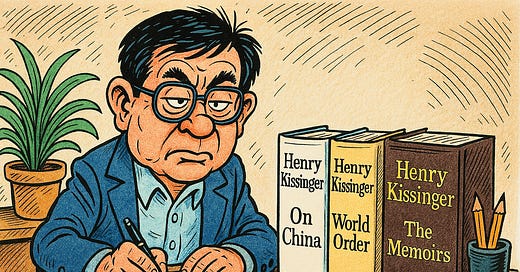The abrupt end to 75 years of U.S. policy on South Korea?
South Korea is not your grandfather’s country. It’s time to rethink the Korean Peninsula.
South Korea has long been shaped—directly and indirectly—by the intellectual legacy of America’s most influential international relations thinkers. Figures like Hans Morgenthau, Henry Kissinger, and Zbigniew Brzezinski cast long shadows over South Korea. It is through their works that decision-makers formed modern U.S. policy on South Korea.
Trump’s approach to the Korean Peninsula upends seventy five years of international relations thought on South Korea. What happens when Morgenthau, Kissinger, and Brzezinski are no longer relevant?
Morgenthau’s focus was on the broad principles of international politics and the behavior of major powers in the context of the Cold War. While he occasionally referred to geopolitical events in Asia, including the Korean War, these were brief mentions used to illustrate general principles of power politics, rather than analyses of South Korea itself. South Korea appears in passing as part of the U.S.–Soviet strategic competition, but Morgenthau never paid close attention to it. However, this did not stop others from applying his work to South Korea.
For Morgenthau, it was natural that South Korea should align its policies with U.S. strategic priorities while also reinforcing its own regional power. South Korea acts as a bulwark against Chinese and North Korean influence in East Asia. Therefore, Seoul should increase defense spending, enhance interoperability with U.S. forces, and support a stable balance of power in the region.
However, reflecting U.S. interests, South Korea also had to be constrained, and discouraged from being too assertive or nationalistic in ways that would provoke conflict and destabilize the U.S.-led order. From a realist standpoint, the primary goal was to ensure South Korea remained a reliable (read controllable) and strategically valuable ally in maintaining U.S. influence and security architecture.
Much like Morgenthau, Henry Kissinger’s works discuss South Korea not as a major focus but rather in the broader context of U.S. Cold War strategy, East Asian geopolitics, and U.S.-China relations. Again, this did not stop others from applying his work to South Korea.
From this perspective, South Korea’s role is as a calculated and flexible partner within the broader architecture of regional balance. Seoul acted as a stable deterrent against North Korea and an important symbol of the U.S. continued presence in East Asia. Again, the ultimate aim was to ensure that South Korea contributed to a stable regional order that supported American primacy without provoking unnecessary confrontation. Moral ambitions—whether about spreading democracy or pursuing reunification—were to be subordinated to the more urgent need for balance, deterrence, and restraint.
Morgenthau and Kissinger then position South Korea in a distinct role - a junior partner, which needs to be strengthened but also controlled. These two thinkers—despite their intellectual brilliance—brought to the table assumptions about South Korea’s national interests that were deeply rooted in American strategic priorities, rather than Korean realities. They imagined a Korea whose core interest was to remain a loyal junior partner in the U.S.-led order, focused on deterrence and alignment. These assumptions, which are still very pervasive in certain thinktanks in Washington, have led to a fundamental misreading of Korean strategic intent, identity, and future direction.
Zbigniew Brzezinski, though often associated with liberal internationalism, shared key realist insights—particularly his emphasis on geopolitical strategy, spheres of influence, and the need for long-term planning in an unpredictable world.
Brzezinski viewed the Korean Peninsula as a critical geopolitical fault line where continental and maritime powers converge. His most influential work, The Grand Chessboard could almost be the blueprint for the last two decades of U.S. policy on the Korean Peninsula.
Applying his thinking, South Korea’s role was not only as a U.S. ally, but as a pivotal actor in the broader architecture of Eurasian stability. The aim then was for South Korea to not maintain a passive or reactive stance in foreign policy but rather pursue a proactive shaping of the regional order through multilateral diplomacy, economic statecraft, and strategic foresight. This meant there was a need to deepen strategic alignment with the U.S. as part of a broader effort to maintain American primacy in Eurasia.
Brzezinski is distinct in that he recognizes Seoul has agency. Perhaps because of the time period, writing when South Korea was well on the way to being a globally significant actor, Brzezinski recognized South Korea’s capacity to choose how to interact with its region - even to the extent of not choosing the U.S.
Brzezinski recognized the temptations towards neutrality or regional accommodation with China that are an inevitable pull on South Korea. To address this, he argued for a robust trilateral alliance with Japan and the U.S. as a counterbalance to rising Chinese influence. In the same way, his ideals supported cautious engagement with North Korea—not out of idealism or cultural affinity, but as a tactical move to prevent Beijing from monopolizing influence.
The emphasis then, is placed on South Korea playing the role of a regional balancer—projecting strength, upholding liberal democratic norms, and supporting a stable U.S.-led security architecture in the Indo-Pacific.
Brzezinski’s thought encapsulates the policies pursued under Republican and Democrat administrations until Donald Trump.
Trump upended seventy five years of international relations thought on South Korea. His transactional approach cannot be understood within the framework of international relations scholarly canon. Morgenthau, Kissinger, and Brzezinski provide no guidance. All that is left is the transaction.
Trump’s transactional approach to South Korea opens a can of worms. For seventy-five years, the influence of Morgenthau, Kissinger, and Brzezinski placed ideological constraints on the Korean Peninsula’s much longer tradition of transactional diplomacy - a tradition stretching back over millennia. It is a tradition that has often reared its head despite efforts to curtail it.
Agree to an armistice? Provide a mutual defense treaty! Want troops in Vietnam? Provide economic incentives and investment! Want troops in Iraq? We’ll send them to the more secure oil producing Kurdistan region! Provide lethal aid to Ukraine? Nope. Buy it instead!
The relationship is sold to the public as shared democratic ideals and shared sacrifice in pursuit of freedom. Peel back the public rhetoric of shared values and enduring friendship, the Korea–U.S. relationship is purely transactional. South Korea offers strategic positioning and economic partnership, and the U.S. provides military protection and technological collaboration.
This give-and-take nature occasionally becomes clear in negotiations over defense cost-sharing, trade disputes, and technology transfers, where each side leverages its assets to extract concessions. Far from being a bond of pure principle, the alliance functions as a calculated transaction, sustained not by sentiment but by mutual benefit.
Trump’s upfront emphasis on transaction removes any last vestige of sentiment. Democratic ideals and shared sacrifice mean nothing. It removes the assumptions inherent in seventy five years of international relations thought on South Korea.
Morgenthau, Kissinger, and Brzezinski and the assumption that South Korea is a regional balancer—inherently always supporting a stable U.S.-led security architecture in the Indo-Pacific is dead in the water. Peeling back the sentiment, and leaving only the transaction pushes South Korea’s policy towards a more autonomous, interest-driven foreign policy. A foreign policy that will not inherently align with that of the U.S.
The choices South Korea makes in the coming decade will likely defy Washington’s expectations—and come as a profound shock to many of its most celebrated foreign policy minds still using Morgenthau, Kissinger, and Brzezinski to understand South Korea and its role in the region. South Korea is not your grandfather’s country. It’s time to rethink the Korean Peninsula.




